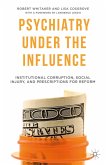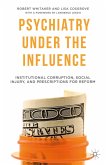"This book will make an enormous contribution towards a more rational, transparent and ethical approach to the use of neuroleptic drugs. By implication it also offers up a strong argument for much wider choice for people in crisis, particularly the provision of minimal drug/drug-free systems of help and support, such as Soteria-type facilities and Open Dialogue. It is a must-read for all psychiatrists and mental health professionals, and its accessibility means that many survivors/service users and carers will find it a valuable ally in their fight for more humane and less harmful alternatives to psychiatric drug treatment." - Philip Thomas, University of Bradford, UK
'a meticulous, balanced history of antipsychotic drugs' - Nature
'All in all, this is a brilliantly clear-eyed, informative, well-referenced and at times disturbing book which should be essential reading for clinicians, policy-makers and patients alike.' - Psychosis: Psychological, Social and Integrative Approaches
'Joanna Moncrieff's courageous research continues to point out that the emperor, while dressed, is wearing the wrong clothes for the job.' - Therapy Today
'Psychiatrist Moncrieff [...] offers a refreshingly critical look at the motivation behind atypical antipsychotic drug use from the pharmaceutical standpoint as well as the pharmacological basis, or lack thereof, in some cases.' - Choice
'This schematic account cannot do justice to the tightness of the arguments and numerous illustrative examples with which Dr Moncrieff charts the all-important transition from the drug-centred to the disease-centred model and its adverse consequences.' - Brain
'a meticulous, balanced history of antipsychotic drugs' - Nature
'All in all, this is a brilliantly clear-eyed, informative, well-referenced and at times disturbing book which should be essential reading for clinicians, policy-makers and patients alike.' - Psychosis: Psychological, Social and Integrative Approaches
'Joanna Moncrieff's courageous research continues to point out that the emperor, while dressed, is wearing the wrong clothes for the job.' - Therapy Today
'Psychiatrist Moncrieff [...] offers a refreshingly critical look at the motivation behind atypical antipsychotic drug use from the pharmaceutical standpoint as well as the pharmacological basis, or lack thereof, in some cases.' - Choice
'This schematic account cannot do justice to the tightness of the arguments and numerous illustrative examples with which Dr Moncrieff charts the all-important transition from the drug-centred to the disease-centred model and its adverse consequences.' - Brain








